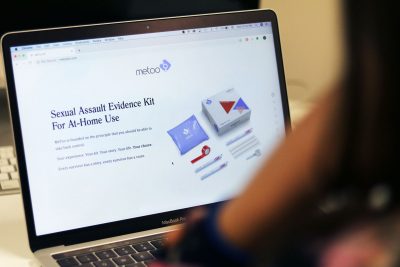
The Boston Area Rape Crisis Center is warning against using an at-home self sexual assault evidence collection kit called the “MeToo Kit,” as they claim the evidence would most likely not be admissible in court.
BARCC joins Michigan Attorney General Dana Nessel and other advocacy groups in speaking out against using the kits, currently being marketed by a Brooklyn based company as a way to ease the evidence collection process and allow the survivor to focus on recovery, according to a BARCC press release.
The take-home kit consists of a variety of swabs, spit containers, plastic bags in which the survivor would enclose their clothes and other articles of evidence and evidence collection tools, according to the kit’s website. The company is also releasing a smartphone app that will instruct the survivor on how to use the tools included within the kit.
The company behind the kit is also working to establish partnerships with universities, news of which caused BARCC to publish their warning not to use the kits, according to the press release.
BARCC warned that, in Massachusetts, sexual assault evidence collection kits should only be administered by a trained sexual assault nurse examiner and that examinations usually take several hours as the nurse documents evidence through a variety of methods, according to BARCC’s press release on Sep. 5.
For example, if a survivor discloses a bite, the nurse will swab the wound for DNA, looking for skin abrasions, according the press release. And if the assault took place on a field, the medical examiner would search for grass stains on clothing and skin.
“Evidence collected in this way by a third party initiates a formal chain of custody that is required for admissibility in law enforcement investigations and criminal prosecutions,” the press release reads.
The kits are so concerning that Michigan Attorney General Nessel has issued a cease and desist order to the MeToo Kit company for misleading marketing materials, according to the press release.
“Your speculation about such admissibility is a poor justification for sales of a product that appears destined to delay sexual assault victims from seeking prompt medical attention,” the order reads.
Katia Santiago-Taylor, BARCC’s advocacy and legislative affairs manager, said that the kit’s main problems are the possibility that the evidence will be incorrectly collected or contaminated and a lack of medical and support for the survivor.
Sexual assault survivors need their physical injuries treated and medication prescribed to reduce the risk of pregnancy and sexually transmitted diseases, Santiago-Taylor said.
Santiago-Taylor said that the kits are not available for purchase yet, and that several organizations, including BARCC and the Campus Advocacy and Prevention Professionals Association, are working together to stop the product from reaching the market.
“[CAPPA] urges colleges and universities to reject the efforts by the MeToo Kits company to form partnerships with them, because the Kits do not connect survivors with healthcare treatment or with rape crisis centers,” Santiago-Taylor said.
Santiago-Taylor said that half of campus sexual assaults occur between the first day of school and Thanksgiving break, and that efforts should be geared towards prevention work, “not focusing on providing kits just in case something happened,” Santiago-Taylor said.
Examples of prevention work include informing students of the importance of consent, encouraging students to report all inappropriate behavior and conducting sexual assault climate surveys on campus.
Santiago-Taylor said she is concerned that encouraging students to use the kits at home may leave them stranded without access to the emotional and physical support they need.
“The reality about sexual evidence collection is much more than collecting DNA,” Santiago-Taylor said. “We’re expecting a survivor to become a forensic expert in the middle of trauma.”
Aiden Coleman, 24, of Brookline, said he understood why the evidence collected by the kit might not be admissible in court, as evidence would be vulnerable to contamination.
“It can’t be really regulated if you’re doing it in your house,” Coleman said. “People can tamper with that unless you have somebody witnessing you doing that.”
Brookline resident Shu Jing, 22, said unless the company behind the kits finds a way to work with the government to figure out a way to allow the evidence in court, colleges and non-profits should refrain from buying them.
“Since it’s not admissible in court, then I think nonprofits should not buy from them since it’s kind of a waste of money,” Jing said.
Hannah Foxman, 25, of Brighton, said the kits should not be forced off the market, but the company behind the kit should place a disclaimer on their products warning users that the evidence collected may not be usable in court.
“I think people still have a right, probably, to [use the kit] on their own,” Foxman said, “like that’s their choice, but I think with a clear warning on the kit of ‘If you use the kit, it may not be able to be used against whoever raped you.”




